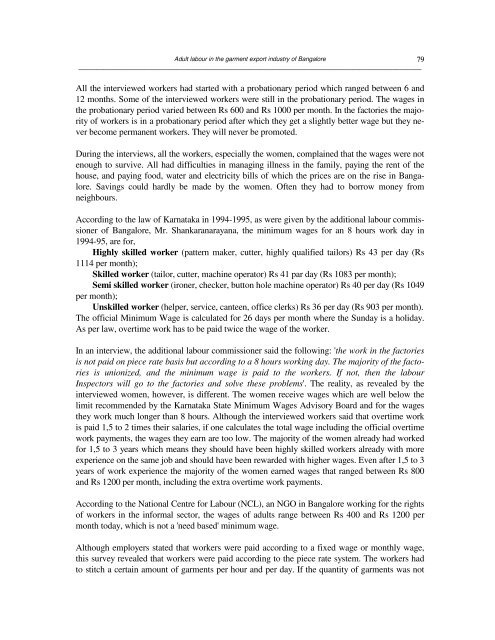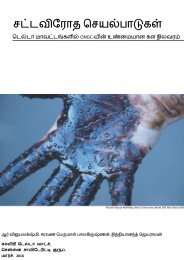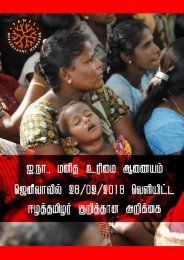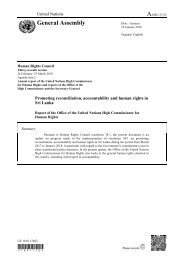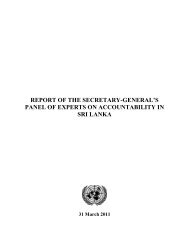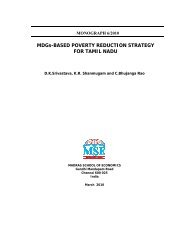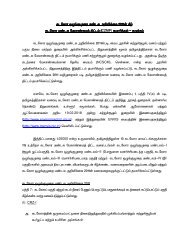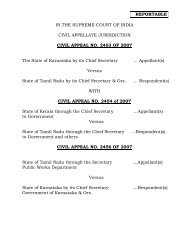You also want an ePaper? Increase the reach of your titles
YUMPU automatically turns print PDFs into web optimized ePapers that Google loves.
Adult <strong>labour</strong> <strong>in</strong> <strong>the</strong> <strong>garment</strong> <strong>export</strong> <strong>in</strong>dustry <strong>of</strong> Bangalore<br />
──────────────────────────────────────────────────────────────────────────────────────────────<br />
All <strong>the</strong> <strong>in</strong>terviewed workers had started with a probationary period which ranged between 6 <strong>and</strong><br />
12 months. Some <strong>of</strong> <strong>the</strong> <strong>in</strong>terviewed workers were still <strong>in</strong> <strong>the</strong> probationary period. The wages <strong>in</strong><br />
<strong>the</strong> probationary period varied between Rs 600 <strong>and</strong> Rs 1000 per month. In <strong>the</strong> factories <strong>the</strong> majority<br />
<strong>of</strong> workers is <strong>in</strong> a probationary period after which <strong>the</strong>y get a slightly better wage but <strong>the</strong>y never<br />
become permanent workers. They will never be promoted.<br />
Dur<strong>in</strong>g <strong>the</strong> <strong>in</strong>terviews, all <strong>the</strong> workers, especially <strong>the</strong> women, compla<strong>in</strong>ed that <strong>the</strong> wages were not<br />
enough to survive. All had difficulties <strong>in</strong> manag<strong>in</strong>g illness <strong>in</strong> <strong>the</strong> family, pay<strong>in</strong>g <strong>the</strong> rent <strong>of</strong> <strong>the</strong><br />
house, <strong>and</strong> pay<strong>in</strong>g food, water <strong>and</strong> electricity bills <strong>of</strong> which <strong>the</strong> prices are on <strong>the</strong> rise <strong>in</strong> Bangalore.<br />
Sav<strong>in</strong>gs could hardly be made by <strong>the</strong> women. Often <strong>the</strong>y had to borrow money from<br />
neighbours.<br />
Accord<strong>in</strong>g to <strong>the</strong> law <strong>of</strong> Karnataka <strong>in</strong> 1994-1995, as were given by <strong>the</strong> additional <strong>labour</strong> commissioner<br />
<strong>of</strong> Bangalore, Mr. Shankaranarayana, <strong>the</strong> m<strong>in</strong>imum wages for an 8 hours work day <strong>in</strong><br />
1994-95, are for,<br />
Highly skilled worker (pattern maker, cutter, highly qualified tailors) Rs 43 per day (Rs<br />
1114 per month);<br />
Skilled worker (tailor, cutter, mach<strong>in</strong>e operator) Rs 41 par day (Rs 1083 per month);<br />
Semi skilled worker (ironer, checker, button hole mach<strong>in</strong>e operator) Rs 40 per day (Rs 1049<br />
per month);<br />
Unskilled worker (helper, service, canteen, <strong>of</strong>fice clerks) Rs 36 per day (Rs 903 per month).<br />
The <strong>of</strong>ficial M<strong>in</strong>imum Wage is calculated for 26 days per month where <strong>the</strong> Sunday is a holiday.<br />
As per law, overtime work has to be paid twice <strong>the</strong> wage <strong>of</strong> <strong>the</strong> worker.<br />
In an <strong>in</strong>terview, <strong>the</strong> additional <strong>labour</strong> commissioner said <strong>the</strong> follow<strong>in</strong>g: '<strong>the</strong> work <strong>in</strong> <strong>the</strong> factories<br />
is not paid on piece rate basis but accord<strong>in</strong>g to a 8 hours work<strong>in</strong>g day. The majority <strong>of</strong> <strong>the</strong> factories<br />
is unionized, <strong>and</strong> <strong>the</strong> m<strong>in</strong>imum wage is paid to <strong>the</strong> workers. If not, <strong>the</strong>n <strong>the</strong> <strong>labour</strong><br />
Inspectors will go to <strong>the</strong> factories <strong>and</strong> solve <strong>the</strong>se problems'. The reality, as revealed by <strong>the</strong><br />
<strong>in</strong>terviewed women, however, is different. The women receive wages which are well below <strong>the</strong><br />
limit recommended by <strong>the</strong> Karnataka State M<strong>in</strong>imum Wages Advisory Board <strong>and</strong> for <strong>the</strong> wages<br />
<strong>the</strong>y work much longer than 8 hours. Although <strong>the</strong> <strong>in</strong>terviewed workers said that overtime work<br />
is paid 1,5 to 2 times <strong>the</strong>ir salaries, if one calculates <strong>the</strong> total wage <strong>in</strong>clud<strong>in</strong>g <strong>the</strong> <strong>of</strong>ficial overtime<br />
work payments, <strong>the</strong> wages <strong>the</strong>y earn are too low. The majority <strong>of</strong> <strong>the</strong> women already had worked<br />
for 1,5 to 3 years which means <strong>the</strong>y should have been highly skilled workers already with more<br />
experience on <strong>the</strong> same job <strong>and</strong> should have been rewarded with higher wages. Even after 1,5 to 3<br />
years <strong>of</strong> work experience <strong>the</strong> majority <strong>of</strong> <strong>the</strong> women earned wages that ranged between Rs 800<br />
<strong>and</strong> Rs 1200 per month, <strong>in</strong>clud<strong>in</strong>g <strong>the</strong> extra overtime work payments.<br />
Accord<strong>in</strong>g to <strong>the</strong> National Centre for Labour (NCL), an NGO <strong>in</strong> Bangalore work<strong>in</strong>g for <strong>the</strong> rights<br />
<strong>of</strong> workers <strong>in</strong> <strong>the</strong> <strong>in</strong>formal sector, <strong>the</strong> wages <strong>of</strong> <strong>adult</strong>s range between Rs 400 <strong>and</strong> Rs 1200 per<br />
month today, which is not a 'need based' m<strong>in</strong>imum wage.<br />
Although employers stated that workers were paid accord<strong>in</strong>g to a fixed wage or monthly wage,<br />
this survey revealed that workers were paid accord<strong>in</strong>g to <strong>the</strong> piece rate system. The workers had<br />
to stitch a certa<strong>in</strong> amount <strong>of</strong> <strong>garment</strong>s per hour <strong>and</strong> per day. If <strong>the</strong> quantity <strong>of</strong> <strong>garment</strong>s was not<br />
79


